How to Grow Your Business Without Social Media (11 Alternatives)

Facebook was founded in 2004, though it took several years before it transitioned from a college network and dating app to the for-everyone juggernaut it is today. Twitter came about in 2006. Other social networks have come and gone in that time, and they all have one thing in common: their use in advertising.
Social networks connect hundreds of millions or even billions of people, making them unprecedented channels for reaching vast swaths of the global population. From Disney to your local mom and pop store, everyone can use social media to reach an audience of potentially interested customers.
The trouble is, well, everyone is using them. Social media platforms aren't all that's cracked up to be with the rising competition, ad costs, and regulations:
- Algorithms mean even when you have a dedicated audience of people following you, you're likely only going to reach 10% of people's newsfeeds (or less) with any given post.
- You can circumvent the algorithms by paying money, but that can grow very expensive, very quickly.
- Social media takes a lot of time and energy to run; you either need to hire someone for you or learn how to do it yourself, with all the effort required. Social media posts are ongoing and continuous, and as soon as they stop, your traffic and sales stop, too.
- Social media audiences and proclivities change. You may have joined a social network to promote yourself, only to find later that your audience has abandoned the platform.
- Most social networks restrict the kinds of content you can advertise; some businesses can't use those platforms at all.
All of this adds up to a problematic and expensive resource to use correctly and, if not used correctly, wastes a ton of time and money. It's no surprise that more and more successful businesses, startups, and entrepreneurs are deciding to skip the social media accounts entirely and focus their efforts on other channels.
Let's get started!
Paid Advertising
One of the most significant drawbacks of using social media today is the lack of reach, enforced via algorithms. It's why trends that promote engagement are so popular; they exploit the algorithms to boost reach. If you don't follow and capitalize on all of these trends, you're stuck in the lower levels of organic reach, which means you have to find another way to reach your audience. Usually, that means paid advertising.
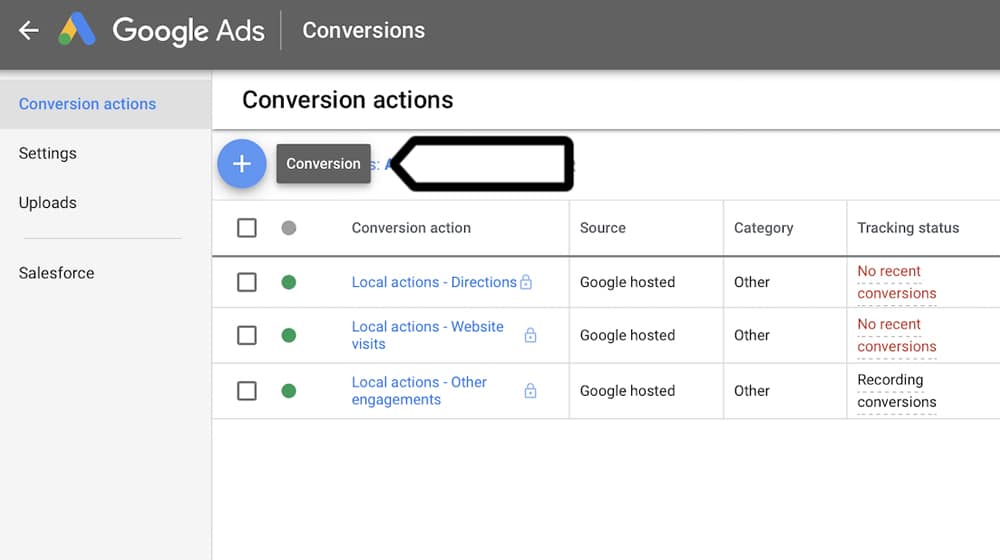
Different networks have different audiences and ways of targeting and optimizing delivery. Ad networks like Google Ads, BuySellAds, or Taboola allow you to pay money to reach an audience. However, they're all generally less of an investment than learning all of that for Facebook or Twitter ads while still maintaining an organic social media presence. If you're going to be paying for advertising anyway, why not pay for advertising through platforms that aren't tied to social media?
Referral or Affiliate Programs
In business, often, one of the best ways to get more customers is to have your existing customers refer them to you. Whether it's a simple word-of-mouth referral, online testimonials, customer reviews, or codified referral programs, anything you do to encourage your existing customers to bring in new customers is an excellent channel to use.
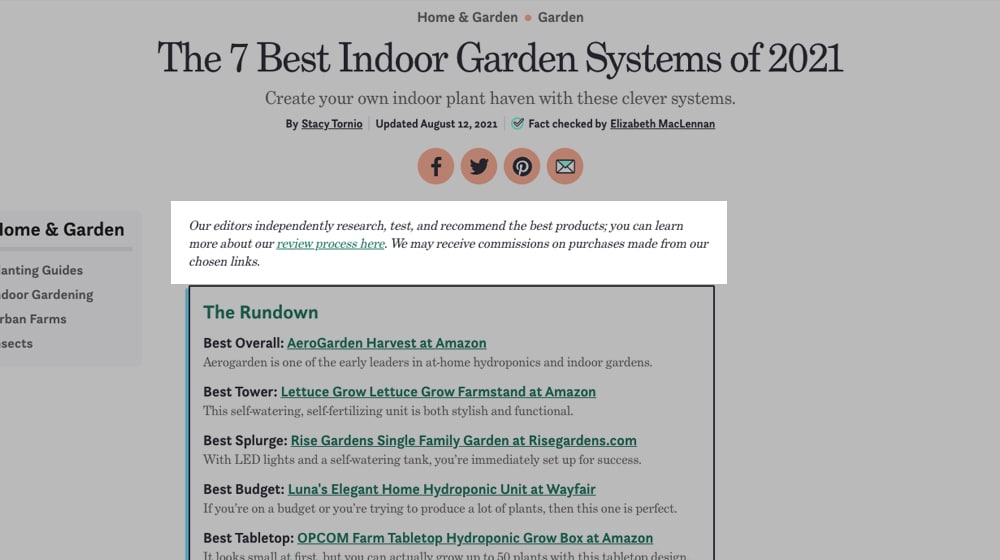
You can even run both a referral program and an affiliate program. Referrals encourage regular users to share a referral code with friends to earn a few goodies or freebies. At the same time, affiliate networks pay out real money to people who act as advertisers for you. They fulfill different niches, but they're both valuable to your business once you get them rolling.
As a bonus, these options can encourage others to advertise you on social media without you needing to do it yourself.
Influencer Partnerships
Another way you can take advantage of social media without being on social media yourself is through influencer marketing. Influencers are already prominent on social media, so rather than compete with them for their audience's attention, all you need to do is reach out to them to promote your content.
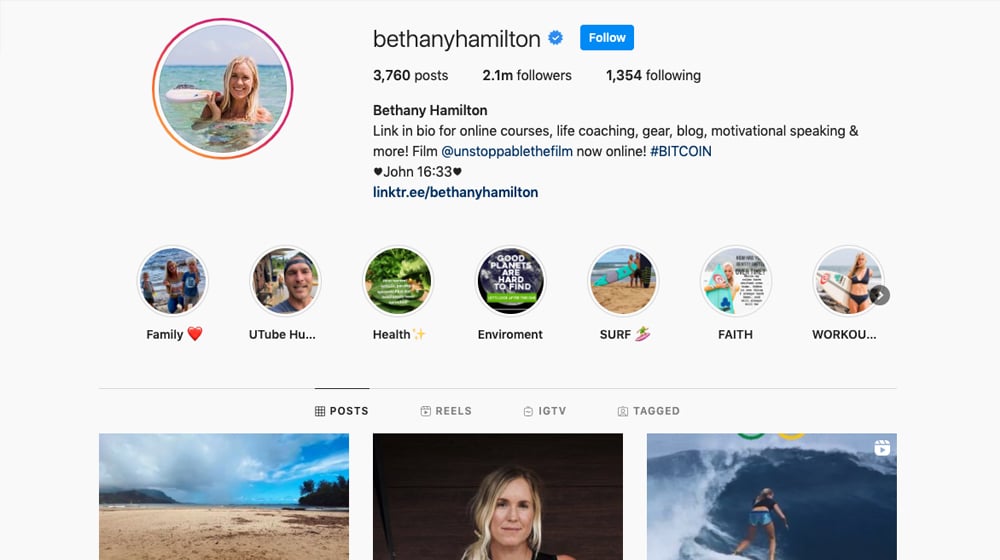
The difficulty here is that there are influencers, and then there are "influencers." There are many people out there who buy followers to make themselves look better, but they aren't influential or have any real exposure. It would help if you were careful with picking people whose audience is likely to be interested in your product and who have a real audience in the first place. It does you no good to work with an influencer who isn't an influencer at all.
Email marketing is one of the best channels any business can use. It's the one channel out of thousands of digital marketing channels that is entirely controlled by you. You aren't beholden to any third-party platform. With social media advertising, the social network can change their rules or arbitrarily decide they don't want you around, and there's pretty much nothing you can do to get back. Paid ad platforms set their prices, and if they decide you're paying more, you're paying more.
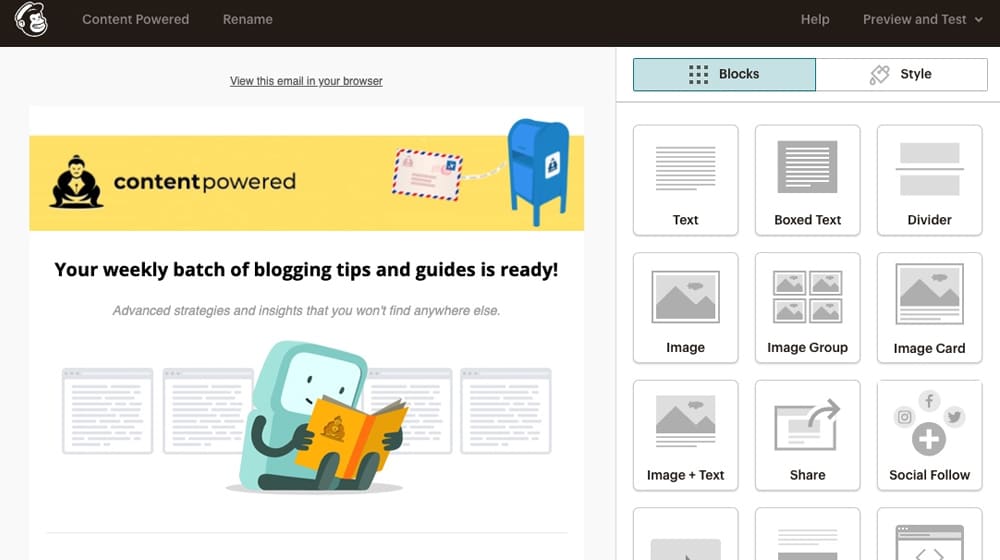
With email, you manage your email list and control your messaging; the only thing you need another company to do is to send the emails. More importantly, none of those email providers can arbitrarily decide to cut off email as a whole, just their services, which still gives you the freedom to use one of the dozens of other email providers out there. If you don't like your newsletter service, you can simply move your list to another and it's business as usual.
TV and Radio Advertising
You can always decide to go more traditional as well. Both television and radio have existed for longer than the internet, and while they're hybridizing a lot these days, they're still distinct channels for marketing.
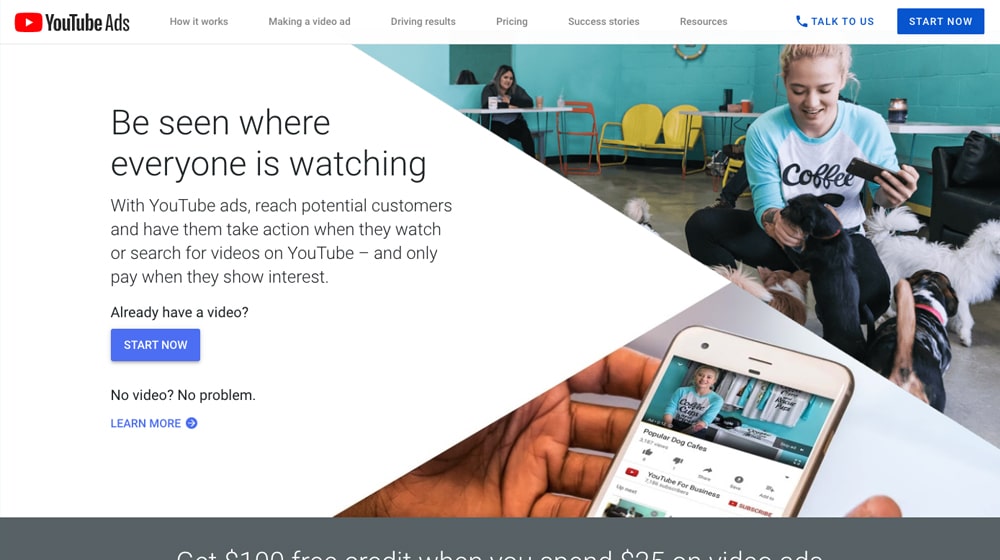
Radio advertising can be tricky for a web business. People will have trouble remembering and typing in a complex URL, so you need something catchy and memorable, even if it's a redirect URL to lead to your actual storefront. TV is a bit better since users can see the URL and pull out a phone as they watch, but it will still lose some fidelity. Either way, the traffic you get from these channels will usually be listed as Direct traffic in your analytics unless you do some shenanigans with redirect URLs to flag it.
Sponsorships
Sponsorships can be an excellent way to advertise your company semi-passively, but they typically require a decent budget. Consider where your target audience is going to be spending their time. What events will they be attending or watching on TV? Then, reach out and ask about becoming a sponsor for the event.
You can also sponsor content. Most websites won't allow overly-promotional content past their editorial process, but these guidelines are relaxed for content sponsors.
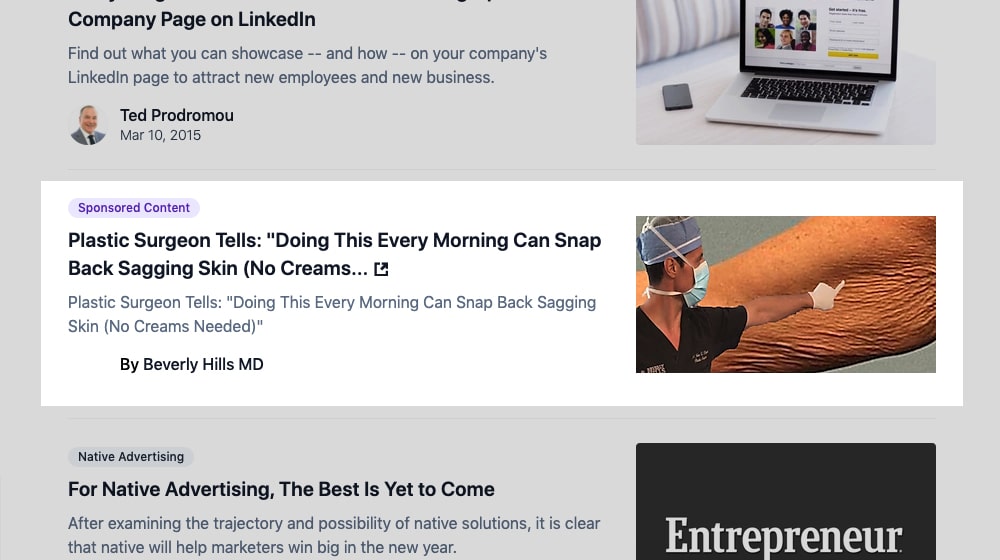
Event sponsorships typically exchange funds (and perhaps use your other channels to promote the event) in trade for promoting your business at the event. That promotion might include your listing in a program, your logo on barriers and wall hangings, or other areas of passive advertising, depending on the amount of money you're contributing to the event. Again; expensive and passive, but adequate for brand awareness if nothing else.
Just because you don't want to use social media as a business doesn't mean you can't use it as a user. There are many communities online you can use to promote your business. You can do so overtly (or covertly by joining a subreddit and saying, "Hey, I run this business relevant to your interests, check it out"). Covert promotion means, for example, joining a community asking questions about your subject and showcasing your knowledge of the topic, and then casually promoting your business. You may or may not disclose your ties, depending on the community and its rules about advertising.
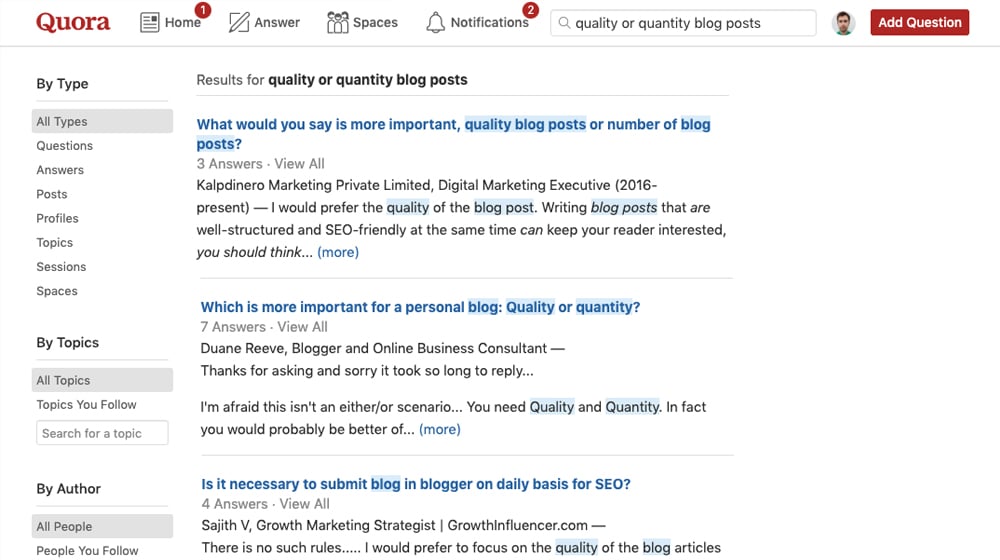
Some of the more prominent channels for this include:
- Quora
- StackOverflow
- Facebook Groups
- LinkedIn Groups
- Web Forums (yes, they still exist.)
Finding the communities is almost as much work as promoting yourself in them, so be prepared to spend some time.
Industry Events and Speaking Engagements
Every industry has events. Events tend to come in two kinds:
- Events for customers. Think something like a Comics Convention, where fans of comics show up to hang out, look at vendors from the industry, and experience new things.
- Events for businesses. Industry and trade shows come to mind here; events where wholesalers and suppliers network with business owners, new technology and techniques are shared, etc.
While the first is more B2C and the second is more B2B, both can be of value to a business. You can learn new things, network with other business owners, find new customers, and more.
The only tricky part about this marketing strategy is, you know, the whole "global pandemic" thing. Once that settles down, though, in-person events will likely pick up with a vengeance, and they'll be an excellent resource for many business owners.
Editorial Content and Guest Posting
Now we're talking. By editorial content here, I mean things like joining the Forbes Business Council, your local newspapers, magazines in the industry, and other sources as a writer. These are less about directly promoting your business than promoting you as a thought leader in your niche. You get your author bio to promote your small business, but otherwise, it's all about establishing yourself as an authority.
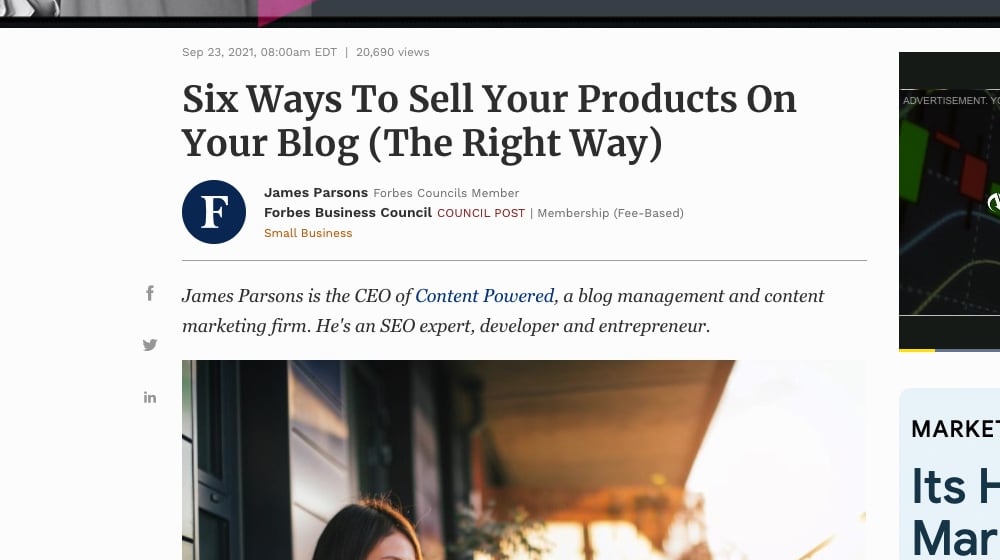
Guest posting is more of a traditional marketing channel. Find publications in your industry, places your potential customers are likely to be reading, and reach out to contribute. You can do it organically with guest post exchanges and other value swaps. Or, you can do it with a sponsored relationship, where you pay for the chance to publish your content on their site. Both can be very effective for building relationships and brand awareness.
A lot goes into a sustained, effective guest posting campaign. It's enough that it's worth a dedicated blog post, so I'm not going to go deep into it here. Instead, suffice it to say that you should cast a wide net, don't get discouraged if a lot of your target sites don't respond, and work your way up the ladder from smaller websites to more significant websites. Don't be afraid to pay for sponsored posts if you think the target site will be valuable. And, as always, make sure you're tracking information about how you perform.
Video and Audio Content
Creating content for YouTube, podcast networks, and other sites is another good way to get exposure and build thought leadership. Videos are easier to make than they have been at any time in the past, but that doesn't mean they're easy. They are, however, significant investments.
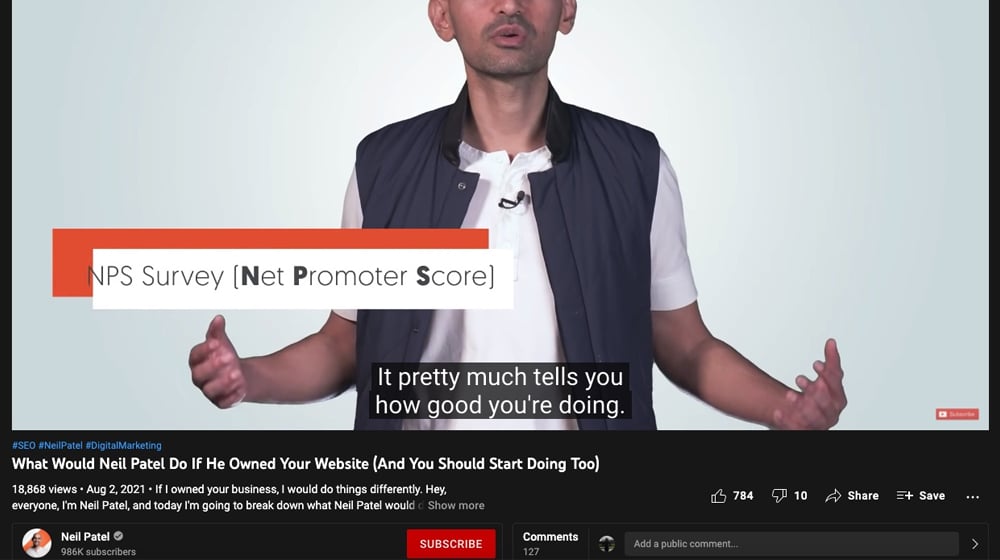
Video content, primarily on YouTube, can be a great way to build both a personal brand and a business presence on one of the largest non-social-network sites online. Podcast content is a little more complicated since there's no single go-to place for podcasts, and – since the barrier to entry is lower – there's more competition.
That said, both of them can be excellent ways to produce media to attract users, and they can snowball very quickly if you catch onto a winning formula.
Content Marketing and SEO
The single biggest channel out of everything on this list is content marketing. Create a blog, write posts every week, create compelling and high-quality content, and optimize your site for search engines.
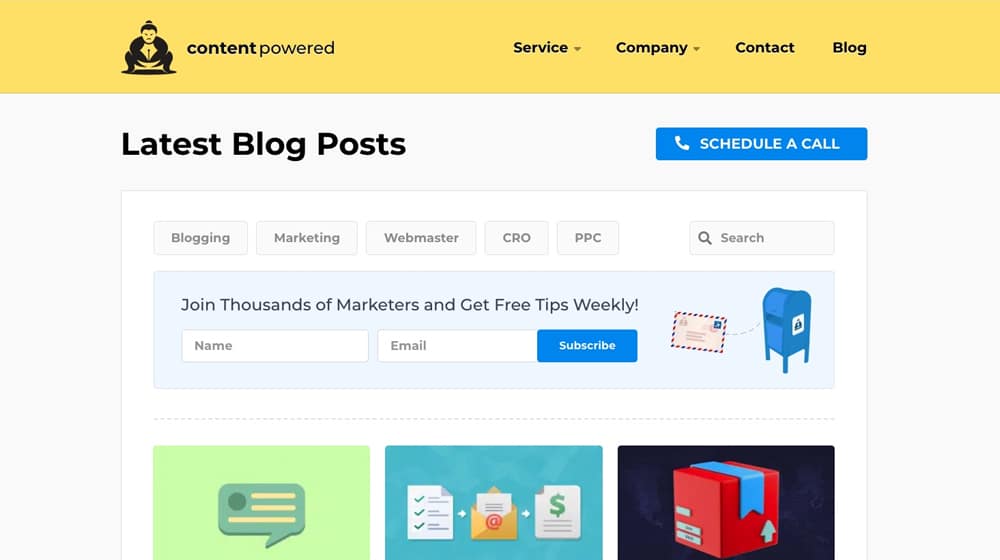
I've saved this one for last because it's both essential and something I can easily direct you to check out other posts on my blog to learn more about. For example, here's a post about building a content strategy. Here's one meant to convince you that blogging is a good idea. I have plenty of content about it; after all, I'm a content marketer and SEO expert, so naturally, I talk about it a lot.
A lot goes into developing a content marketing plan and adhering to SEO guidelines. I recognize that many companies don't have the time or resources to handle it. That's why I started my business, after all.
Wrapping Up
As someone who used to invest time and money into social media promotion, I now look for several things when choosing a new channel to invest those resources into:
- Control. With social networks fluctuating in cost, algorithms changing every day, and otherwise living at the whims of the social networks, having control of your marketing is a huge benefit. With blogging, content marketing, videos, and newsletters, you control those channels and can promote just about anything you want.
- Cost. Social media ad costs are not always predictable, but many of these other options are. In addition to price, it would help if you had your pulse on your spending and your ROI. The ROI for ads is pretty straightforward and often calculated for you. However, the ROI for content marketing is a much more challenging calculation. It can take years for content marketing efforts to get off the ground, but a single blog post or video can eventually pay for itself a hundred times over. It's essential to keep this in mind when evaluating your return on investment - the window for some of these methods will be longer than others.
- Long-term value. If you stop this marketing channel, will your sales stop too? When you're tied to social media, everything grinds to a halt if you stop posting or paying for ads. This scenario isn't the case with many other forms of marketing, such as blogging and video creation. Those content pieces can drive traffic and value for many years to come. With some marketing channels, you're renting clicks, and with others, you're building and owning long-term assets. It's essential to understand the distinction.
Whichever you choose, make sure you understand these three factors and how they affect you.
Are you looking to invest in a marketing channel that isn't social-related? What have you been successful (or unsuccessful) with? Do you agree or disagree with any of these items on this list? Please let me know in the comments section!



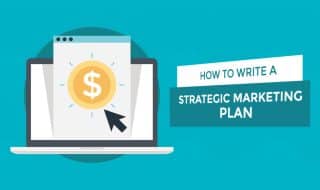

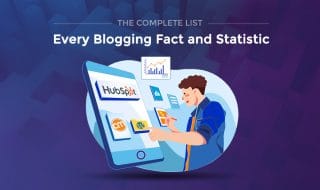




February 17, 2022
I've always thought of doing a podcast but I don't think we have enough resources for that right now. Definitely keeping that in mind though!
February 21, 2022
Thanks for sharing! I've been considering starting a podcast myself. From what I understand, it's hard to get started, but you begin to get into a rhythm.
February 18, 2022
I think these are great ideas, James. It's great to know there are a lot of choices aside from social media.
February 21, 2022
Thanks, Gina!